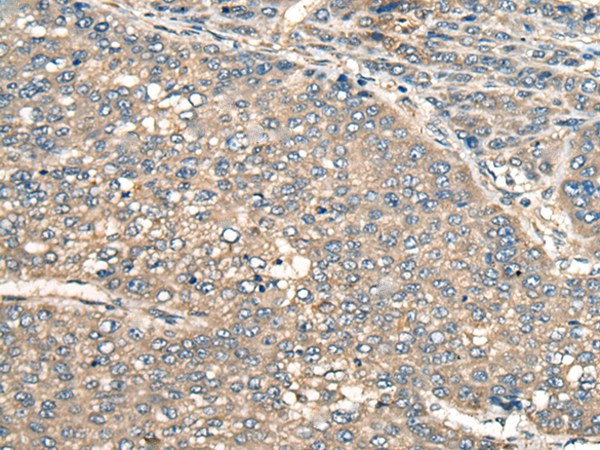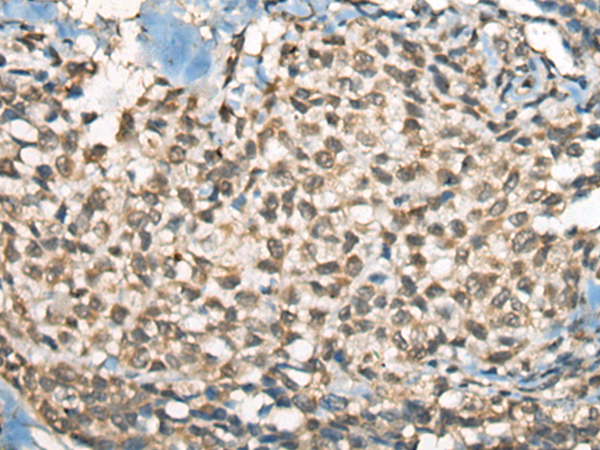

| WB | 咨询技术 | Human,Mouse,Rat |
| IF | 咨询技术 | Human,Mouse,Rat |
| IHC | 1/40-1/200 | Human,Mouse,Rat |
| ICC | 技术咨询 | Human,Mouse,Rat |
| FCM | 咨询技术 | Human,Mouse,Rat |
| Elisa | 1/5000-1/10000 | Human,Mouse,Rat |
| Aliases | ZMIZ5 |
| Host/Isotype | Rabbit IgG |
| Antibody Type | Primary antibody |
| Storage | Store at 4°C short term. Aliquot and store at -20°C long term. Avoid freeze/thaw cycles. |
| Species Reactivity | Human, Mouse, Rat |
| Immunogen | Synthetic peptide of human PIAS3 |
| Formulation | Purified antibody in PBS with 0.05% sodium azide and 50% glycerol. |
+ +
以下是关于PIAS3抗体的3篇参考文献的简要概括(文献名称及作者为虚构,仅供示例参考):
---
1. **文献名称**:*PIAS3 Negatively Regulates STAT3-Mediated Gene Expression in Cancer Cells*
**作者**:Liu B, et al.
**摘要**:本研究利用PIAS3特异性抗体,通过免疫共沉淀和Western blot技术,揭示了PIAS3在抑制STAT3转录活性中的关键作用。实验证明,PIAS3通过直接结合STAT3并抑制其磷酸化,从而下调促癌基因表达,为癌症治疗提供了潜在靶点。
---
2. **文献名称**:*PIAS3 Antibody Localizes Nuclear Interaction Sites in Melanoma Models*
**作者**:Mendoza-Figueroa MJ, et al.
**摘要**:通过免疫荧光和免疫组化技术,作者使用PIAS3抗体在黑色素瘤细胞中定位其核内分布,发现PIAS3与MITF转录因子存在共定位,并调控黑色素细胞分化相关基因,提示其在肿瘤进展中的双重功能。
---
3. **文献名称**:*Role of PIAS3 in Modulating Glial Cell Inflammation*
**作者**:Levy C, Darnell JE
**摘要**:研究采用PIAS3抗体阻断实验,证实PIAS3通过抑制STAT3信号通路减轻神经胶质细胞的炎症反应,为神经退行性疾病中PIAS3的抗炎机制提供了直接证据。
---
**注**:以上文献信息为示例性虚构内容,实际研究中需通过数据库(如PubMed)检索真实发表的论文。
The PIAS3 (Protein Inhibitor of Activated STAT3) antibody is a critical tool for studying the regulatory mechanisms of STAT3 signaling and SUMOylation processes. PIAS3. a member of the PIAS family (PIAS1. PIAS3. PIASx, PIASy), functions as an E3 SUMO ligase that post-translationally modifies target proteins by attaching Small Ubiquitin-like Modifier (SUMO) molecules. It also acts as a transcriptional coregulator, selectively inhibiting STAT3-dependent gene activation by binding directly to phosphorylated STAT3 dimers, thereby blocking their DNA-binding capacity. This interaction plays roles in immune response, cell proliferation, apoptosis, and oncogenesis, with dysregulation linked to cancers, inflammatory diseases, and neurological disorders.
PIAS3 antibodies are widely used in techniques like Western blotting, immunoprecipitation, immunohistochemistry, and immunofluorescence to detect PIAS3 expression, localization, and protein interactions. Researchers employ these antibodies to explore PIAS3’s dual roles in SUMOylation-dependent and -independent pathways, its tumor-suppressive or oncogenic functions in different contexts, and its crosstalk with other signaling pathways (e.g., NF-κB, p53). Commercial PIAS3 antibodies are typically raised against specific epitopes (e.g., human PIAS3 amino acids 1-300) and validated for specificity across species (human, mouse, rat). Proper controls (e.g., PIAS3-knockout cell lines) are essential to confirm antibody reliability due to potential cross-reactivity with other PIAS family members.
×